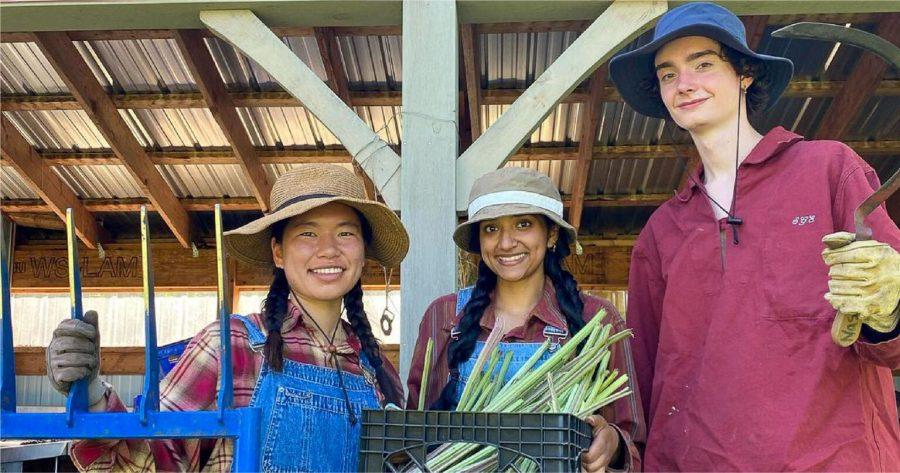For over a decade, the Carleton Student Organic Farm has operated as a self-sustaining farm, providing fresh and organic produce to Bon Appetit for use in the dining halls. The sales are intended to pay for equipment and the salaries of the farm interns, allowing the internship to be financially self-sufficient. Historically, the farm has been supported by the Center of Community and Civic Engagement (CCCE), but after the 2021 growing season and careful deliberation among past interns, the farm is being transferred to the Sustainability Office for oversight.
The 1.5-acre farm is entirely run by three Farm Interns who work full time during the summer to grow vegetables. Interns continue their duties throughout the school year by harvesting their cultivated vegetables, hosting volunteer events and preparing the farm for winter. In the winter, the interns manage the hiring of the next generation of Farm Interns. Then, they provide guidance to the new Farm Interns during Spring Term as they prepare for the planting season. As a result of the cancellation of the 2020 Farm Internship program due to the COVID-19 pandemic, 2021 Farm Interns Simran Kadam ’23, Eunice Gao ’24 and Soren Eversoll ’24 were faced with many obstacles and challenges — especially when getting started.
Temporarily halting the program resulted in a gap of knowledge for the 2021 Farm Interns, who had no prior knowledge or experience in farming. Kadam commented that “because of our inexperience farming, we were unable to solve problems by ourselves. Thus, we relied heavily on the farm advisor and past interns. However, these figures were volunteering their time and understandably not always available to offer help or advice. This lack of preparation caused the season to have a rocky start.”
After a tumultuous season, Kadam raised the idea for the Farm Internship to move offices: “I pitched the idea to Alex Miller after the challenges of my season.” The farm largely serves the Carleton community and does not extend greatly outside of it. Considering the nature of the CCCE, which strives to interact with and form meaningful relationships with the community, the Sustainability Office seemed like a much better fit. Kadam added, “Now, the Sustainability Office runs the program as a sustainability initiative that connects students and the campus community to our local food system.”
After the farm was shifted from the CCCE to the Sustainability Office, Alex Miller, former Sustainability Program Coordinator, completely re envisioned the Farm Internship program and a plethora of changes were enacted. Kadam elaborated, “Before, all the information regarding the farm was passed down through interns and Advisor David Hougen-Eitzman. Miller documented and housed years of information that is now easily accessible.”
Another significant positive change is that previous years’ interns will now act as paid mentors to train the new interns. Kadam explained why this is important: “During my year, the previous interns took time out of their day and provided us with invaluable help. We would not have been successful without their advice, but it seemed unfair that they were expected to put in all these hours unpaid. Now, interns are fairly compensated for their time.” This will make the position more accessible, and incoming interns will undoubtedly be provided with adequate information to have a successful summer of farming.
The oversight of the Sustainability Office also results in an increased focus on making the farm a model of sustainable and ethical food production. Not only do the goals of the farm and the Sustainability Office align extremely well, but the Sustainability Office also has more capacity to house the program. Kadam elaborated on this: “While the CCCE did an amazing job with the internship, the CCCE runs many food-related events and programs. The Sustainability Office only has one program focused on food. This means there are more resources in the form of student work hours to be allocated to managing and running the Farm Internship program.”
After the shift of oversight from the CCCE to the Sustainability Office, many changes to the Farm Internship program have been enacted, and many more are to come. This summer, the farm will host three new interns who, with the help of Martha Larson, David Hougen-Eitzman, Simran Kadam and Eunice Gao, will face fewer challenges and, eventually, a bountiful harvest.












